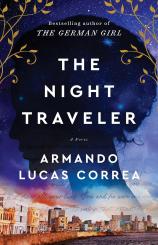Reading Group Guide
Discussion Questions
The Night Traveler

1. Images of light and dark permeate THE NIGHT TRAVELERS. How does this imagery inform the novel’s larger themes, characters and even plot?
2. Consider the epigraph, a line from the poet Rumi: “Night travelers are full of light.” Who would you consider a “night traveler” in this novel? What does it mean to be a night traveler in the various circumstances and eras in which these characters live?
3. As much as THE NIGHT TRAVELERS is a sweeping historical novel, it is also an intimate look at one family’s generations of mothers and daughters. Compare and contrast the mother/daughter relationships in this novel. How is each generation different from the previous?
4. There is much intergenerational trauma passed from mother to daughter. How, in her own way, does each woman try to make a better life for her own daughter?
5. When Lilith is still young, her mother, Ally, remarks, “Lilith learns whatever she sets her mind to” (49). How do you see this throughout the course of Lilith’s life?
6. How does history --- on both a personal and geopolitical level --- repeat itself in these three different eras?
7. Are there ways in which you see the historical events and attitudes from the novel repeating themselves in our own present day? Give examples.
8. Nadine, who spent much of her young life not wanting to know anything about her past, finally comes to the realization that “[a] person can’t spend their whole life forgetting” (249). What does it take for Nadine to change her mind about remembering the past?
9. Before she sends Lilith away, Ally reflects on the Herzog family’s son, who was taken to a concentration camp by the Nazis. The Herzogs’ grief kept them from being able to even mention their son’s name after his brutal death. Ally “promised herself that Lilith would always be known by her name, no matter where they sent her. She would always be Lilith, to herself and everyone else” (74). How does Lilith remain herself, both in her own heart and to others?
10. As an adult, in sun-filled Havana, Lilith still trusts the dark more than the light. In the library of the President, she thinks to herself, “The sun isn’t allowed in here. The thought made Lilith feel safe” (115). What does it mean that Lilith feels safer in the dark? How does this affect her actions as the Cuban revolution intensifies?
11. When Nadine meets Elizabeth, she reasons that “Lilith and Elizabeth shared the same mother, they must have something in common. But only one was the traitor’s child” (295). Compare and contrast Elizabeth and Lilith’s upbringings and consider whether they would have been able to forge a relationship had they had the chance to meet.
12. Why do you think the author chose to end the novel with so many jumps in time? What effect did this have on your reading experience?
13. Were you surprised by Lilith and Nadine’s reunion? What does this opportunity to meet in person mean for Nadine? For Luna?
14. At the very end of the novel, Luna begins to write what is, perhaps, the very novel you just read. Before she begins to write, she realizes that “One of her many lives had begun” (337). How do you interpret this? How might she live many lives?
The Night Traveler
- Publication Date: November 7, 2023
- Genres: Fiction, Historical Fiction, Women's Fiction
- Paperback: 368 pages
- Publisher: Washington Square Press
- ISBN-10: 1501187996
- ISBN-13: 9781501187995







